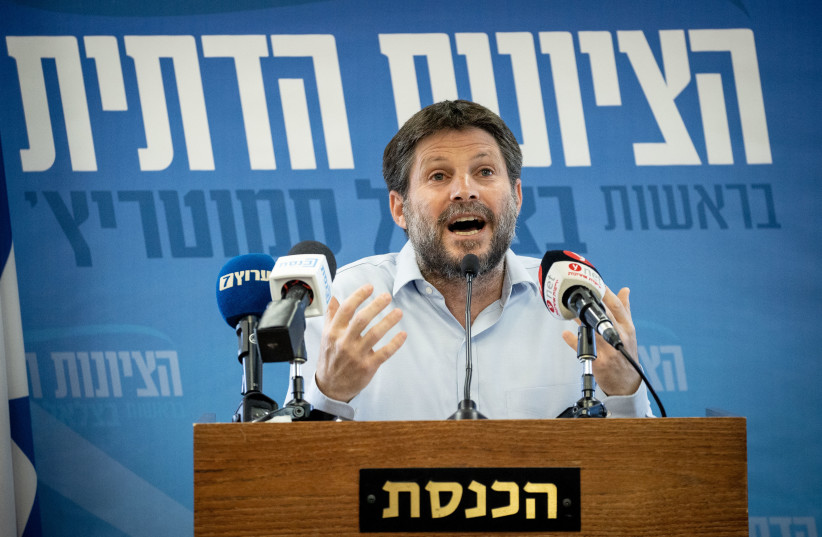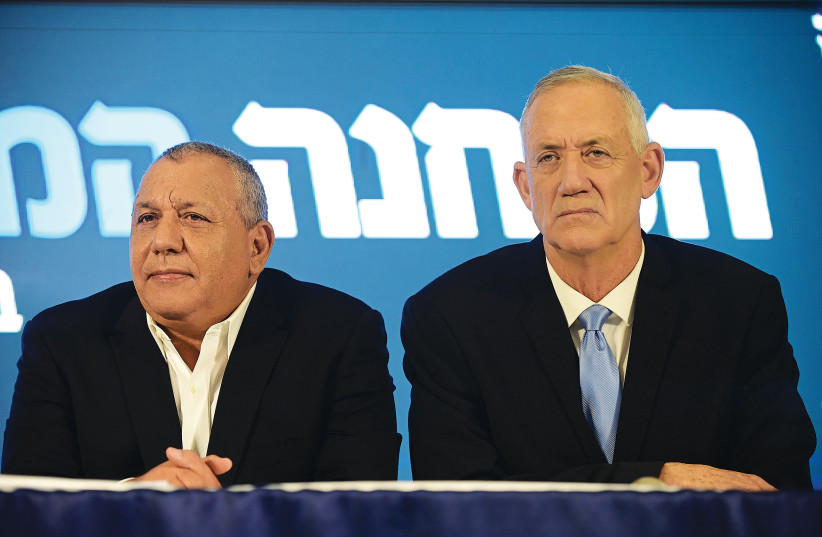Israeli government could lower IDF draft exemption age for haredi Jews

IDF official: New exemption age for ultra-Orthodox Jews acceptable • Benny Gantz, Gadi Eisenkot present alternative plan to Smotrich's
A forum composed of Prime Minister Benjamin Netanyahu, Finance Minister Bezalel Smotrich, Defense Minister Yoav Gallant, Ministerial Liaison to the Knesset David (Dudi) Amsalem and coalition whip MK Ofir Katz met on Sunday at the Prime Minister’s Office in Jerusalem to discuss an outline for a new haredi (ultra-Orthodox) draft bill, a spokesperson for Gallant confirmed.
The meeting came after haredi party leaders clarified to Netanyahu last week that despite the sensitivity of the issue, they are insisting on the fulfillment of a coalition agreement promise to pass such a bill by the time Israel’s budget passes on May 29.
Smotrich’s proposal is called “A New Social Contract for Sharing the Burden,” according to a report by Israel Hayom. The idea is that the government will prioritize equality in the “economic burden” over the “military burden,” while minimizing the inequality to IDF soldiers by shortening the length of service and providing benefits, according to the report.
According to the existing Draft Law that expires on July 31, haredi students who leave a yeshiva before the age of 26 are required to serve in the IDF. A central part of Smotrich’s plan is to lower the “exemption age.” This will enable ultra-Orthodox men to join the workforce earlier.
According to Channel 12’s Dafna Liel, two disagreements emerged in the meeting.
The first was the amount of compensation for those who serve. Gallant reportedly demanded billions of shekels per year, but the Finance Ministry deemed this unrealistic. The second was the proposed age of exemption. While Netanyahu supported the IDF’s proposal of 23, Smotrich reportedly wanted to lower the age to 21, while Gallant preferred 22.
The Defense Ministry spokesperson did not answer the Jerusalem Post’s request to confirm that this was indeed the position expressed at the meeting.
IDF official: New exemption age for ultra-Orthodox Jews acceptable
A senior military official said in a briefing on Sunday that an exemption age of 23 was acceptable to the IDF, if it would come alongside a package of benefits for those who do serve. However, the official stressed that the military must remain the “people’s army,” and it is thus “forbidden to violate the balance of drafting all populaces, including haredim.” The IDF will thus continue to develop specialized tracks for them, the official said.
The official added that regardless of the haredi question, the IDF believed in advancing what it calls the “Differential Model,” which is part of its multi-year plan that is expected to pass as part of the 2023-2024 budget. This model includes a base period of mandatory service, after which it would discharge the soldiers it can do without, while retaining and rewarding financially the more highly-trained conscripts it needs to continue serving.
Initially passed in 2014, the current Draft Law sets annual allotments of haredi draftees to the IDF and sanctions yeshivot that do not meet these allotments. However, in September 2017, the High Court of Justice deemed the bill unconstitutional, since the exemption it gave was ruled to be too sweeping and thus it discriminated against those who do serve. The bill’s expiry date was repeatedly delayed until July 31.
The coalition thus must come up with a law that the High Court will accept.
Yisrael Beytenu chairman MK Avigdor Liberman, who dealt with the issue extensively as defense minister under Netanyahu in 2018, is a vocal opponent of haredi draft exemption.
“The government is attempting to give a bribe to the public that serves in the IDF, in exchange for a draft evasion law,” Liberman wrote. “Values should not be replaced by budgets. The only thing that reality demands is equality in sharing the burden – by everyone.”
Labor MK Gilad Kariv also voiced criticism.
“Financial benefits will not fix the discrimination between blood and blood. Every conscription plan needs to include tracks for the haredi public, either as continuous military or civil service, or in a format of yearly reserve duty,” he wrote.
Kariv also drew a link between the government’s proposed judicial reforms and its conscription plan.
“Hundreds of thousands of civilians in the streets understand perfectly the link between the judicial reform and the attempt to give a sweeping exemption from service to the haredi public. The haredi politicians should know that the serving public will not submissively accept the planned legislation, and will stand against it in the streets,” Kariv wrote.
Benny Gantz, Gadi Eisenkot present alternative plan
Three National Unity politicians presented a proposal of their own on Sunday afternoon, which they called “Israeli Service”: party chairman MK Benny Gantz, who is a former IDF chief of staff and defense minister; National Unity No. 3 MK Gadi Eisenkot, who is also a former IDF chief of staff; and Inbar Harosh-Giti, former head of the Defense Ministry Service Directorate and number 18 on the party’s Knesset list.
They opposed what they called “payment in exchange for exemption,” arguing that it is at the heart of the proposal that the government was discussing. Instead of giving up on national service for large swaths of Israeli citizens, they argued, the state should broaden the concept of service and adapt it to the different groups in Israeli society.
“There is danger in the future to the army of the people,” Gantz said, adding that while there was room for a “differential model,” it should come as an incentive, not as compensation.
“There are things that do not have a price tag – belonging, love of the homeland, readiness to sacrifice one’s life,” Gantz said. “I believe that the Israeli public who is not willing to give up on democracy will also not agree to announce that the value of service has expired.”
Eisenkot added that “a plan is necessary to strengthen the IDF as a stately army of the people, and not to bypass the Draft Law.”
Gantz, Eisenkot and Harosh-Giti’s proposal was to create a new system whereby all citizens who the IDF chooses not to draft will come under the responsibility of the Defense Ministry’s Service Directorate. The military would get first pick out of Israel’s Jewish and male Druze citizens. Israeli Arab citizens would not go through the IDF’s selection process, and instead would head directly to the Service Directorate, which would then assign them to services such as first aid and rescue, or volunteering in welfare or inner-community organizations.
The plan was already proposed as a law during the current Knesset, Gantz said.
The Likud said in response, “As of now there are no agreements on the draft issue. In any case, the IDF’s proposal that is on the table is similar to that of Benny Gantz, and is different only in that it includes shortening the service, significant salary raises for combat soldiers, and economic benefits for ex-soldiers and reservists.”
Jerusalem Post Store
`; document.getElementById("linkPremium").innerHTML = cont; var divWithLink = document.getElementById("premium-link"); if (divWithLink !== null && divWithLink !== 'undefined') { divWithLink.style.border = "solid 1px #cb0f3e"; divWithLink.style.textAlign = "center"; divWithLink.style.marginBottom = "15px"; divWithLink.style.marginTop = "15px"; divWithLink.style.width = "100%"; divWithLink.style.backgroundColor = "#122952"; divWithLink.style.color = "#ffffff"; divWithLink.style.lineHeight = "1.5"; } } (function (v, i) { });


